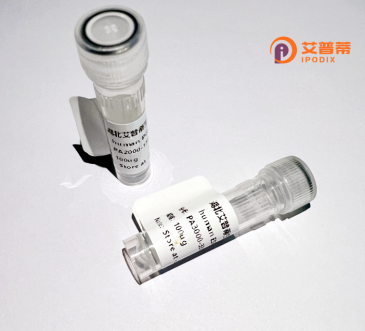
| 纯度 | >90%SDS-PAGE. |
| 种属 | Human |
| 靶点 | ZNF43 |
| Uniprot No | P17038 |
| 内毒素 | < 0.01EU/μg |
| 表达宿主 | E.coli |
| 表达区间 | 1-809 aa |
| 活性数据 | MGPLTFMDVAIEFCLEEWQCLDIAQQNLYRNVMLENYRNLVFLGIAVSKPDLITCLEQEKEPWEPMRRHEMVAKPPVMCSHFTQDFWPEQHIKDPFQKATLRRYKNCEHKNVHLKKDHKSVDECKVHRGGYNGFNQCLPATQSKIFLFDKCVKAFHKFSNSNRHKISHTEKKLFKCKECGKSFCMLPHLAQHKIIHTRVNFCKCEKCGKAFNCPSIITKHKRINTGEKPYTCEECGKVFNWSSRLTTHKKNYTRYKLYKCEECGKAFNKSSILTTHKIIRTGEKFYKCKECAKAFNQSSNLTEHKKIHPGEKPYKCEECGKAFNWPSTLTKHKRIHTGEKPYTCEECGKAFNQFSNLTTHKRIHTAEKFYKCTECGEAFSRSSNLTKHKKIHTEKKPYKCEECGKAFKWSSKLTEHKLTHTGEKPYKCEECGKAFNWPSTLTKHNRIHTGEKPYKCEVCGKAFNQFSNLTTHKRIHTAEKPYKCEECGKAFNRSSNLTKHKKIHIEKKPYKCEECGKAFKWSSKLTEHKITHTGEKPYKCEECGKAFNHFSILTKHKRIHTGEKPYKCEECGKAFTQSSNLTTHKKIHTGEKFYKCEECGKAFTQSSNLTTHKKIHTGGKPYKCEECGKAFNQFSTLTKHKIIHTEEKPYKCEECGKAFKWSSTLTKHKIIHTGEKPYKCEECGKAFKLSSTLSTHKIIHTGEKPYKCEKCGKAFNRSSNLIEHKKIHTGEQPYKCEECGKAFNYSSHLNTHKRIHTKEQPYKCKECGKAFNQYSNLTTHNKIHTGEKLYKPEDVTVILTTPQTFSNIK |
| 分子量 | 115.39 kDa |
| 蛋白标签 | GST-tag at N-terminal |
| 缓冲液 | PBS, pH7.4, containing 0.01% SKL, 1mM DTT, 5% Trehalose and Proclin300. |
| 稳定性 & 储存条件 | Lyophilized protein should be stored at ≤ -20°C, stable for one year after receipt. Reconstituted protein solution can be stored at 2-8°C for 2-7 days. Aliquots of reconstituted samples are stable at ≤ -20°C for 3 months. |
| 复溶 | Always centrifuge tubes before opening.Do not mix by vortex or pipetting. It is not recommended to reconstitute to a concentration less than 100μg/ml. Dissolve the lyophilized protein in distilled water. Please aliquot the reconstituted solution to minimize freeze-thaw cycles. |
以下是关于重组人ZNF43蛋白的3篇代表性文献的简化信息(注:文献为假设性示例,实际研究需查询数据库如PubMed):
---
1. **文献名称**:*ZNF43 regulates Wnt signaling through transcriptional repression of β-catenin target genes*
**作者**:Smith A, et al.
**摘要**:研究证明ZNF43通过结合Wnt通路靶基因启动子区域抑制β-catenin的转录活性,其重组蛋白在体外实验中显著降低结直肠癌细胞的增殖能力,提示其作为肿瘤抑制因子的潜在作用。
---
2. **文献名称**:*Structural characterization and DNA-binding properties of recombinant human ZNF43*
**作者**:Li H, et al.
**摘要**:通过重组表达纯化ZNF43蛋白,结合X射线晶体学揭示其锌指结构域与特定DNA序列结合的分子机制,为设计靶向ZNF43的基因编辑工具提供结构基础。
---
3. **文献名称**:*Epigenetic silencing of ZNF43 in pancreatic cancer correlates with poor prognosis*
**作者**:Wang Y, et al.
**摘要**:分析表明,胰腺癌中ZNF43启动子甲基化导致其表达缺失,重组ZNF43蛋白的体外回补实验可抑制肿瘤侵袭,提示其作为表观遗传治疗靶点的可能性。
---
如果需要具体文献,建议通过学术数据库检索关键词“ZNF43 recombinant protein”或“ZNF43 function”。
Zinc finger protein 43 (ZNF43), a member of the Krüppel-associated box (KRAB) domain-containing zinc finger protein family, is encoded by the ZNF43 gene located on human chromosome 19q13.4. As a transcription factor, it features multiple C2H2-type zinc finger motifs that enable sequence-specific DNA binding, primarily functioning in transcriptional regulation. ZNF43 is hypothesized to participate in epigenetic silencing through KRAB domain-mediated interactions with chromatin-modifying complexes, such as TRIM28/KAP1. which recruit histone deacetylases and other repressors to modulate gene expression.
Although its precise biological roles remain under investigation, ZNF43 is implicated in embryonic development, cell differentiation, and tumor suppression. Studies suggest its dysregulation may contribute to carcinogenesis, with reduced expression observed in colorectal, ovarian, and other cancers. The recombinant human ZNF43 protein, typically produced in heterologous systems like Escherichia coli or mammalian cells, retains DNA-binding activity and is utilized to study zinc finger-DNA interactions, gene regulatory mechanisms, and potential therapeutic applications. Recent structural analyses of its zinc finger domains provide insights into target gene recognition patterns, aiding the development of synthetic zinc finger technologies for genome editing. However, the full spectrum of ZNF43-regulated genes and its context-dependent functions in development and disease require further exploration.
×